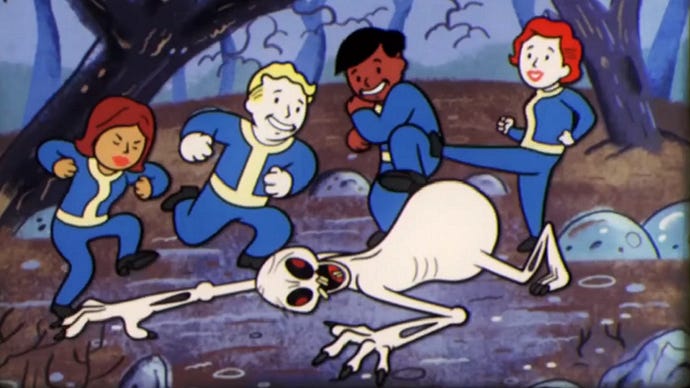The crushing menace of Metro Exodus vs the cartoonish optimism of Fallout 76
The Metro series of games, based on the novels by Russian author Dmitry Glukhovsky, are about a fear of the foreign.
Nuclear annihilation and Cold War paranoia are at the heart of the games, of course, but the FPS series also highlights how communities retreat inwards, banding into smaller groups, terrified of outsiders.
These groups all survive in the veins of Moscow, clustered inside the 200km of Russian Metro system.
For most survivors, the irradiated surface is a no-go zone. Only the bravest rangers explore the airy wastes, battling ‘demons’ - mutated horrors that nest in the crumbling city - to bring back supplies for the communities.
Up there, among the twisted remains of buildings and charred corpses, even the air will kill you.
Metro is a comment on xenophobia - what happens when humans resort to petty tribalism. While our hero, Artyom, is adventurous and open-minded, the tunnels of the metro are filled with fascist groups. Away from the threat of other humans, there’s also a race of unknowable entities who are seemingly slaughtering survivors for no reason. These creatures are known only as ‘the Dark Ones’.
Metro’s world is actively hostile and there’s no room for levity. It’s a view of nuclear annihilation through the lens of a pessimist raised in a country ruled over by a dictator.
It’s interesting to note the differences between that setting and the world of Fallout, in which people are trapped in a safe zone - the vaults - and dream of returning to the surface.
While Fallout’s worlds aren’t exactly secure, there’s a notable optimism running through them. Upon leaving the vault in a Fallout game, you’re always met with a dazzlingly bright light, a world of possibilities, and old-timey hits crackling across the airwaves.
In Metro, your brief forays to the surface are met with the blood-curdling screams of winged beasts, nuclear storms, and an ever-decreasing oxygen supply. You don’t get a choice whether to be nice or mean to people - the only choice is to survive.
In contrast, even nukes are good in the recently released Fallout 76. Drop a nuke on an area and it will eventually fizzle out, leaving behind high level enemies and rare loot. Perhaps the Trump administration is right - radiation is good for you!
Fallout’s outlook is all over the face of its mascot, Vault Boy. Its whole shtick is aping the government propaganda videos of the Cold War. Nuclear war isn’t as scary when you’re being told how to survive by a friendly cartoon turtle.
The differences between the two cultures is also clear in the choice of the currency. Fallout’s world sees people trading in bottle caps, while bullets are what makes Metro’s markets tick - your only worth is your ability to kill and maim.
Only with Metro Exodus is the series moving away from the cramped confines of the dank Russian tunnels, exploring the unknown on a mobile base. In this sequel Artyom is finally seeing what lies beyond Moscow, visiting communities who have somehow survived on the surface. It turns out there’s a world beyond those tunnels, and not all of it is hostile. Maybe xenophobia is bad, it turns out.
Just as Fallout has increasingly been about rebuilding as the series has gone on, it appears there’s a glimmer of hope at the end of the tracks for Metro, too. While the two series will never meet (Metro Exodus is as bleak as ever, don’t worry), it’s interesting to see the American team at Bethesda Game Studios and the Ukrainian team at 4A Games looking to the future, both rebuilding a new world at the same time.




